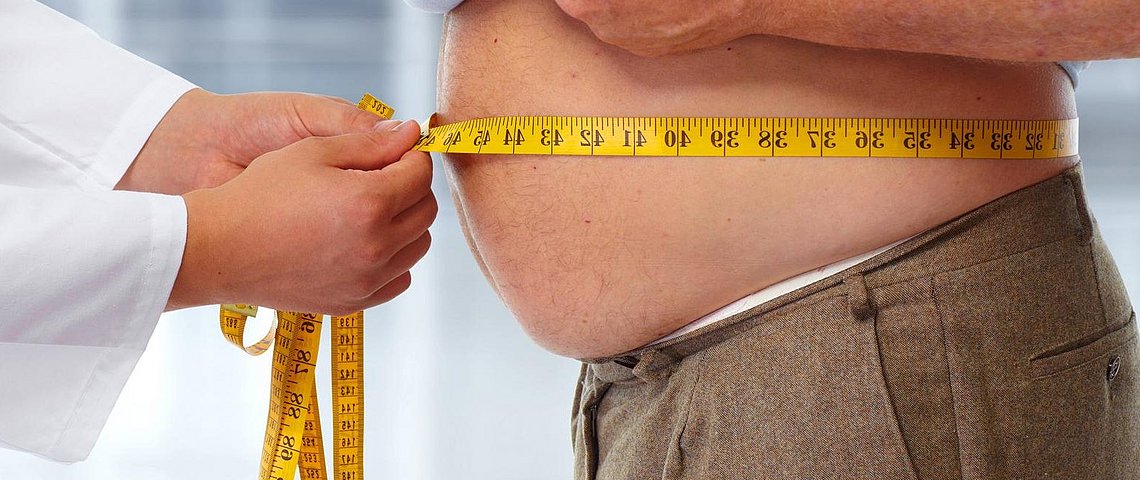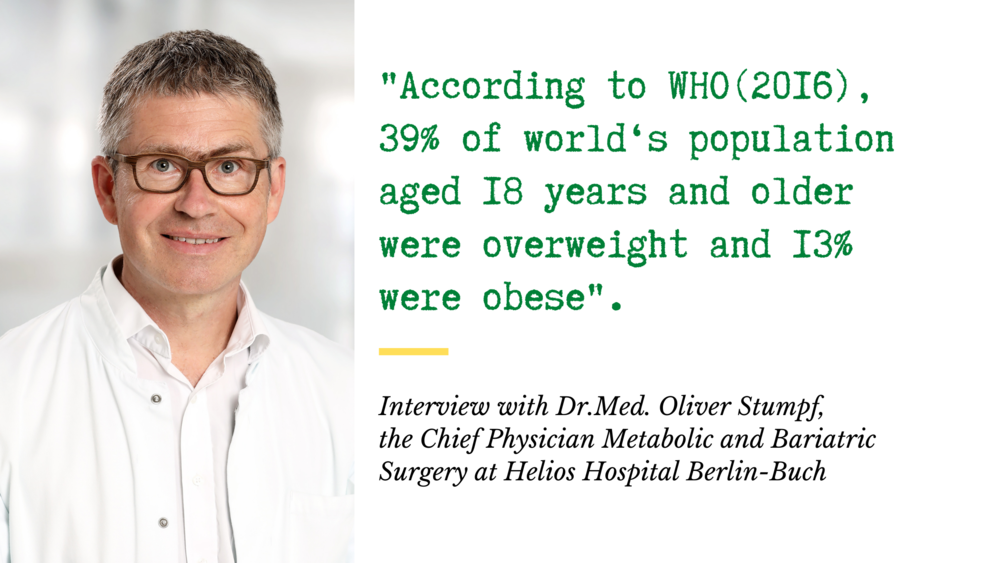
Sleeve gastrectomy
Severe overweight is often belittled. Talking about overweight people, you might hear such words as "lack of discipline" or "binge eating". But this is not fait to the patients and doesn’t define them, reckons Professor Till Hasenberg, chief physician at the Department for Bariatric and Metabolic surgery at the Adiposity Center West. He knows well the prejudices patients have to deal with. "Obesity is a disease, not a lifestyle. It can have many different causes and requires treatment.”
About 70 % of the causes of obesity are genetic and 30 % are external factors
“Severe overweight is often belittled. Talking about overweight people, you might hear such words as "lack of discipline" or "binge eating". But this is not fait to the patients and doesn’t define them.”
Professor Till Hasenberg, chief physician at the Department for Bariatric and Metabolic surgery at the Adiposity Center West.
Therapeutic approaches in obesity surgery
What therapeutic approaches are applied? An answer to this question knows Barbara König, senior physician in charge at the Adiposity Center West. "Adiposity treatment is more than just bariatric stomach surgery. We employ an integrated approach in our multi-stage therapy concept, which is very important," explains the doctor.
Before the surgery, the patients first receive psychological and nutritional support. First of all, the doctors collect a medical history of the disease and possible comorbidities during a preliminary consultation. The most common comorbidities are heartburn, sleep apnea or type 2 diabetes mellitus.
"Adiposity treatment is more than just bariatric stomach surgery. We employ an integrated approach in our multi-stage therapy concept, which is very important,"
explains Dr. Barbara König, senior physician at the Obesity Center West
Knowing your body mass index (BMI) plays a major role in therapy. This measurement takes into consideration the patient's height, age and weight. A BMI more than 30 is indicates obesity, while a BMI more than 40 serves as an indication for possible surgery. If you have concomitant diseases that go alongside with obesity, surgery is considered from a BMI of 35.
What is a sleeve gastrectomy?
Sleeve gastrectomy is a most common surgical procedure. It can also be performed on patients who are extreme obese. During sleeve gastrectomy about 90 % of the stomach volume is removed, leaving only a tube-shaped stomach.
“Sleeve gastrectomy has now become a routine procedure for us. We follow a fixed protocol, so the procedure only takes 45 to 75 minutes.”,
Barbara König, senior consultant | Adiposity Center West
Sleeve gastrectomy is a laparascopic, i. e. minimally invasive surgery, which is done with the keyhole technique. The surgeon will make only five small incisions ranging in size from 0.5 to 1.2 cm. The abdomen is first filled with a gas so that the surgeon has a better view of the abdominal cavity. The surgeons use a special technique to divide blood vessels and spleen from the stomach and then staple the stomach vertically and remove the larger part.
An important step of the surgery is the so-called leak test. At the end of the procedure, the anesthetist briefly fills the new stomach with a blue liquid through a small tube to prove that the sutures are absolutely tight. This test ensures the low rate of complications, if the procedure is performed by an experienced surgeon.
Before the surgery
"In order to improve the chance of successful surgery and lose weight, a patient should follow a healthy life-style routine, which means a balanced nutrition and sufficient physical activity”, says Barbara König.
Therefore, each patient receives an individual diet and exercise plans from experts, such as physical therapist and dieticians. However just eating healthy and balanced food isn’t enough.
"After a stomach reduction, patients can eat significantly less food. So in order to prepare the body and the stomach for a new amount of calories, patients should limit the food intake in advance," says Dr. König.
The exercise will take about 2 and a half hours per week. Patients also have regular meetings with specialized psychotherapists and in in self-help groups. In some cases a patient should also fill an application to the health insurance company.
Besides, the doctors hold a doctor-patient seminar, during which the patients are informed about possibilities and proved therapy methods in the field of baristric surgery.
Preparation period is much shorter for patients with a BMI of 50 or more, because a diet doesn’t work anymore and the health risks due to obesity are significantly increased. If a conservative therapy isn’t successful, the patient is eligible for the surgery.
Advantages of a sleeve gastrectomy
Sleeve gastrectomy amounts to about 70 % of all bariatric interventions. This numbers indicates that the patients cope well with the surgery and the risks are low. An alternative would be the bypass surgery. It’s more extensive, but experience has shown that gastric bypass patients are usually almost get rid of heartburn or it might even be completely gone.
Sleeve gastrectomy amounts to about 70 % of all bariatric interventions.
Dr. Barbara Koenig, senior physician at the Adiposity center west
During a gastric bypass operation, the duodenum and the stomach are bypassed, the small intestine is connected directly to a stomach pouch. This procedure is also known as Roux-en-Y gastric bypass. Approximately 20 % of patients with the reduced stomach develop heartburn after the surgery. Those patient benefit from surgery during which the reduced stomach is made into a bypass.
Before, a widespread method for reducing the volume of the stomach was the gastric band. However, the procedure had the disadvantage that led to more frequent complications and had a lower success rate than other methods, so now it’s rarely used in bariatric surgery.
After the sleeve gastrectomy
The end of a bariatric surgery doesn’t mean the end of the therapy. The doctors of the Adiposity Center West take care of their patients for the rest of their lives. Patients consult the doctors during the first year after the surgery, then 3 months and then one year after the procedure. After that follow-up consultations take place once a year. Considering that the treatment covers several medical fields, it can be continued if necessary. Additional treatments are carried out in one place.
A problem with a rapid weight loss is that the skin, which has been extremely stretched over many years, loses its elasticity. For this reason, we work closely together with the plastic surgery department.
Professor Till Hasenberg, Chief Physician for Obesity and Metabolic Surgery at the Adiposity Center West
For example, Professor Ahmet Bozkurt, Director of the Department for Plastic and Aesthetic Surgery, Hand Surgery and Burn Treatment offers regular consultations for bariatric patients, where he advises on skin tightening options.
Psychological support
The patients at the Adiposity Center West can receive not only stomach surgery, but also a holistic therapy concept, including physiological and psychological therapie," says Dr. Babara König. After all, not only your body, but also mind has to be prepared to let go of the excessive weight.
New feeling of satiety
After the procedure, patients change their lives completely, due to a particular effect on their diet and gastrointestinal tract. At the beginning the new stomach is already full with small liquid portions of 100-150 ml. In the course of time, the stomach volume slightly increases and the patient may consume liquid as well as solid food up to 200 grams or milliliters. To compare: a healthy person has the stomach ten times larger.
This is why patients lose weight so quick. The effect is particularly noticeable in the first six months. The patient change not only their bodies, but also their mindset. Overall, patients lose an average of 60 to 70 % of their original body weight within a short period of time. Considering so small stomach volume, it’s necessary to support vitamin absorption: patients additionally take vitamins twice a day and inject vitamin B12 once every 3 months.
Improvement of the general state of health
Sleeve gastrectomy outcome doesn’t limit only to weight loss, especially in patients with type 2 diabetes. They report an improvement in their insulin levels, and in some cases the disease even disappears completely. Surgery is therefore not performed on diabetics patient to reduce weight, but because of the positive effect on blood sugar levels.
Related stories:
Do you need more information about Helios Hospitals or want to schedule your treatment?






